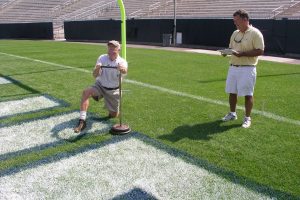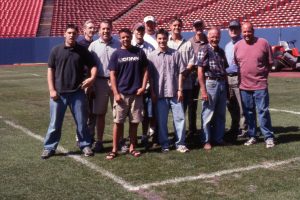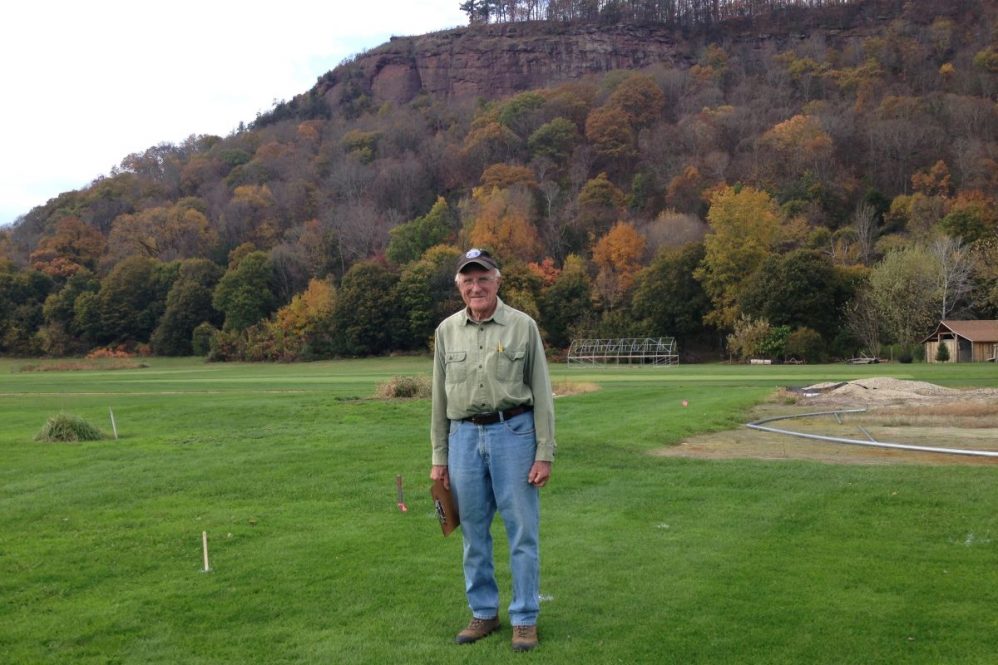A scholarship to honor the late William (Bill) Dest will help support undergraduate students pursuing turfgrass programs in the College of Agriculture, Health and Natural Resources.
Dest, a former UConn student, research associate, and professor, passed away in April at the age of 91.

Starting in 2022, the William and Anne Dest Scholarship will provide between $1,200 to $1,500 to one student each year, selected by faculty in the Department of Plant Science and Landscape Architecture.
Growing up in urban New Haven, Dest developed a strong passion for the environment, something he passed on to his family.
“My father and mother were an inspiration for all of us,” says Paul Dest, Bill Dest’s son. “They not only instilled in us a respect and love for nature but also a sense of decency, fairness, and kindness toward others, no matter what their race, religious background, or nationality. My father always said that all his achievements in his adult life are attributable to one person: Anne, his incredible wife of 65 years and the mother of their nine children.”
Dest first came to UConn in 1967. He had already established a family and career working as a superintendent of the Wethersfield Country Club, and had served in the Korean War.

After graduating with a B.S. in plant science, Dest earned his master’s degree in agronomy, working with former UConn professor Derek Allinson.
“He had tremendous passion,” Allinson says. “Passion coupled with determination. He was going to do it and he loved turfgrass.”
Dest continued his career with UConn, accepting a position as a research associate.
After several years in this role, Dest realized his educational journey wasn’t yet complete. So, he went to Rutgers University and completed his Ph.D. in 1980, earning him the affectionate family nickname “Dr. Dirt,” before returning to UConn once more.
“My father was particularly drawn to soils and plants,” Paul Dest says. “He followed this passion and that is where he spent his career.”
As a full faculty member in the Department of Plant Science, as it was formerly called, Dest played a fundamental role in developing the turfgrass programs. Merging his research and years of professional experience, Dest helped expand and shape the program to prepare students to meet the needs of a rapidly evolving field.
“Bill was basically our entire turfgrass science program,” says Professor Karl Guillard, who took over the program after Dest’s retirement. “He was a one-man band. I was willing to take over because I had Bill in my back pocket…I was standing on the shoulders of Bill.”
Bill was basically our entire turfgrass science program. I was standing on the shoulders of Bill. — Karl Guillard
During his long career, Dest studied fertilizer methods for turfgrasses, green speeds for golf courses, and helped establish standards for sports playing fields. Dest established himself as a respected researcher and professional across the country and internationally.
“Bill was always there for me,” says Steve Rackliffe, extension professor of turfgrass science. “I look at him as one of the people who helped shape my career. The industry really respected Bill. He would help anybody for the betterment of any sport.”
When Dest retired from his faculty position in the late ‘90s, he continued working as a private consultant and kept up his research at UConn and with J. Scott Ebdon at the University of Massachusetts, Amherst.
“The thing about Bill was that he always had that academic curiosity, even after he retired,” Ebdon says. “He loved everything about turf and the industry. And people loved him back.”
Dest had a love for his work that those who knew him say was infectious. Allinson also says Dest would undoubtedly approve of the scholarship.
“I think he would love and appreciate it”, Allinson says. “Bill made a major contribution to our program in turfgrass science over many years. He would see the scholarship as both a continuation of those efforts and simultaneously creating opportunities for students.”
Follow UConn CAHNR on social media



